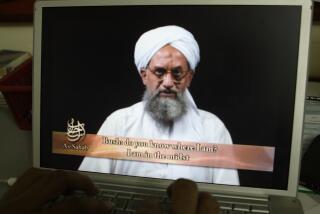Hussein Losing His Grip, but Alternative Might Be More of Same, CIA Chief Says : Intelligence: Gates says the Iraqi leader’s power base is shrinking, but he refuses to predict his ouster.
- Share via
WASHINGTON — Saddam Hussein is facing increasing challenges to his grip on power in Iraq, but even if he were deposed, his successor probably would come from the current ruling circle and share Hussein’s regional military ambitions, CIA Director Robert M. Gates said Friday.
Gates would not predict whether or when Hussein might be toppled but said that his decades of repressive rule demonstrate that “he will do whatever it takes to cling to power.”
But the CIA chief said U.S. intelligence has evidence that Hussein’s power base is shrinking and that restlessness is growing, even among his core supporters in Iraq’s Sunni Muslim minority.
“A likely successor to Saddam would be someone from the current Sunni-Arab-dominated ruling circle--someone who shares Saddam’s perspectives, especially his belief in the political efficacy of ruthless violence,” Gates told the House Armed Services Committee.
Even though such a leader would lack Hussein’s long-established power base, Gates said, over time Iraq would try to regain its position as the dominant Arab military power.
Gates also raised alarms about Iran’s efforts to enhance its military and political posture in the region, including a nuclear arms program and a concerted effort to procure advanced weaponry from a variety of foreign sources.
Syria and Libya continue to sponsor terrorism and try to buy, steal or develop their own weapons of mass destruction and the missiles to deliver them, he said.
Taken together, these developments could mean that U.S. troops may find themselves defending American interests in the volatile Middle East again soon.
“If in the next few years it again becomes necessary to deploy U.S. combat power abroad,” the CIA chief said, “the strategically vital region encompassing the Middle East and the Persian Gulf is at the top of the list of likely locales.”
Gates said that Baghdad continues an aggressive effort to rebuild its military infrastructure, which has been weakened by the Persian Gulf War and 18 months of U.N. economic sanctions.
He said that Iraq claims to have partially repaired 200 military-industrial facilities and that U.S. intelligence has detected “significant reconstruction” at two dozen other weapons plants.
He said that Iraq retains about 24 army divisions, thousands of tanks, armored personnel carriers and long-range artillery pieces, hundreds of Scud missiles along with some mobile launchers, and 300 combat aircraft.
In addition, he said that Baghdad has been able to hide critical nuclear weapons-manufacturing equipment from U.N. inspectors and has extensive supplies of chemical weapons materials--precursor chemicals, bulk poison gas agents, munitions for delivering the gases and production equipment.
Gates said that Iraq also retains a clandestine stockpile of biological weapons and “microbial fermentation equipment and pathogen cultures” to produce new stores. Once U.N. inspections are ended, Gates asserted, Baghdad could resume production of battlefield toxins “within weeks.”
In neighboring Iran, which was militarily and economically devastated by its eight-year war with Iraq ending in 1988, the regime of President Hashemi Rafsanjani is determined to rebuild its military and counter U.S. influence in the Middle East, Gates said.
He claimed that Tehran plans to spend $2 billion a year in hard currency on foreign weapons purchases, including Russian and Chinese warplanes and antiaircraft missiles, attack submarines from Russia and armored vehicles from Eastern European suppliers.
Iran also is seeking nuclear, biological and chemical weapons capabilities, although Gates said Tehran probably will not be able to produce a nuclear weapon before the year 2000.
The collapse of the Soviet Union has deprived Syria of its only reliable supplier of high-technology weapons, while the Libyan government of Moammar Kadafi is preoccupied with the fear of U.N. sanctions over its role in the bombing of Pan Am Flight 103, Gates said.
Both states are relatively quiescent on the terrorism front and pose no immediate military threat to their neighbors, the CIA director said.
“Still, such developments have not led these governments to abandon their objectives--we see no evidence of that--only to alter their strategies and timetables,” he said, referring to Iran and Iraq as well.
“In particular, the escalating cost and difficulty of building first-rate conventional forces have increased the attractiveness of weapons of mass destruction.”
More to Read
Sign up for Essential California
The most important California stories and recommendations in your inbox every morning.
You may occasionally receive promotional content from the Los Angeles Times.












